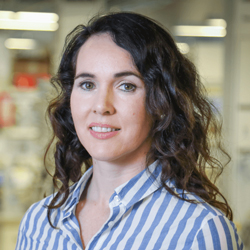Two NUI Galway researchers share their research and experience on leading teams developing bio innovations to deliver benefits for patients and public health in Ireland.

Prof Emer McGrath
Associate Professor of Neurology, School of Medicine, NUI Galway Consultant Neurologist, Saolta University Healthcare Group
Prof Emer McGrath, based at the HRB Clinical Research Facility at NUI Galway, heads a team of researchers across three countries researching neurovascular disorders, including cognitive impairment, dementia and stroke.
“We aim to develop a risk score which can calculate a person’s likelihood of developing dementia before clinical signs, such as memory problems, occur” says Prof McGrath, who was awarded €655,524 funding for the project by the Health Research Board.
“This could give us a headstart in attempting to slow down, stop or potentially even reverse this disease in the future.”
Her research focuses on:
- The contribution of risk factors such as high blood pressure, diet and exercise to the risk of cognitive decline and dementia throughout a person’s lifespan. “Greater knowledge of lifestyle risk factors could enable us to make societal changes to modify this risk,” says Prof McGrath.
- The development of biomarkers, measured using simple blood tests, to help predict future dementia risk at the earliest stages and help tailor approaches to treatment.
- The development of technologies and strategies for population-level dementia screening.
- “People at highest risk could be referred to brain health clinics at an early stage, people at low risk could be reassured, and effective screening programmes could help us efficiently plan our use of public health resources,” says Prof McGrath.

Dr Alison Mary Liddy
Principal Investigator Hydrobloc Project, College of Medicine, Nursing and Health Sciences, NUI Galway
Dr Alison Mary Liddy heads a team of researchers aiming to develop a new treatment for the chronic pain of osteoarthritis. This project was awarded the one million Euro SFI innovation prize, which enabled significant progression in the development of the treatment.
“At present we are targeting osteoarthritis pain in the knee but if our new gel treatment works, it could be used for other joints,” says Dr Liddy, whose team works at National University of Ireland Galway.
Dr Liddy’s recognised there was a big need for new chronic pain treatments during her fellowship with the NUI’s BioInnovate program, which brings together teams from medical, engineering, business and technical backgrounds, to discover unmet clinical needs and align them with market opportunities.
“Being a fellow gave me the opportunity to observe clinical procedures to see what was needed and to collaborate with clinicians to come up with new treatments for chronic pain,” she says.
“Our new injectable treatment is being developed to deliver superior long lasting pain relief so patients can stay active for longer,” she says. “Osteoarthritis is a progressive condition, and current injectable treatments only give short-term relief and medications have some side effects that means they can be counter-indicated for long-term use, especially for older people.”
Dr Liddy’s team are expecting to carry out first in human studies late next year.
More details of research at the NUI Galway College of Medicine, Nursing and Health Sciences here


